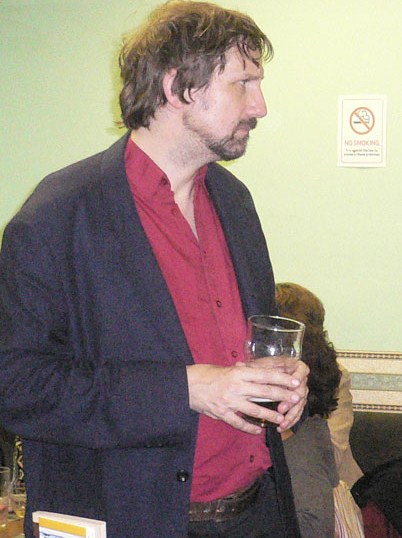Harry Gilonis (photo by Tom Raworth)
Harry Gilonis saw my link last Friday to Alan Brownjohn’s comment re the UK poetry wars & recalled that “Poetry Review both published his partisan account as if it were neutral, and in addition published no ripostes.” Here is the one Gilonis sent at the time.
Poetry Review
22 Betterton Street
London WC2H 9BX
29 July 2007
Dear Sirs,
I’ve recently read Alan Brownjohn’s piece on the ‘poetry wars’ in Poetry Review Vol. 97 no. 2, and it Will Not Do. We are presented, with an air of high magnanimity, with a regrettable contretemps between “the broad mainstream of modern verse” and Bob Cobbing’s chums with flowers in their hair and beer down their vests. It really wasn’t like that!
The Poetry Society was a membership organisation, mostly made up of amateur readers and writers, mostly non-metropolitan. The Poetry Review reflected their slightly timid tastes, and the Poetry Society was run by a Council mostly made up of minor poets with insufficient public success to keep them busier elsewhere. This was not a mainstream but a side-channel; admittedly not a backwater, but calm and safe; a Norfolk Broad, perhaps.
Contrariwise, the radical efflux turns out to be a bigger body of water than the self-proclaimed mainstream: the magazine Second Aeon reported in one issue at the time the publication of 400 new poetry books from avant-gardists. When Eric Mottram called this a Poetry Revival it was a statement of fact; that the Revival was too large and too variegated to be satisfactorily summed-up doesn’t alter that. Nor was all of its activity outrageously wild, of its moment, doomed to subsequent obscurity. Doubtless Bob Cobbing in full spate might frighten the unfamiliar (he did me!); but that was a small part of what Barry’s ‘radicals’ were propounding, what the Revival offered, what the Review published under Mottram.
This last is probably as good a test-case as one could want, given that the Review’s reach was far wider than 21 Earls Court Square, and copies are still – for the assiduous - findable. Alan Brownjohn’s suggestion that that “average readers of poetry would recognise few of the names” insults the average reader, but might be accurate about the particular provinciality of the Poetry Society pre-Revival; and again post- , as it returned to its slumbers.
I would hope that even if Alan Brownjohn did not then recognise most of the names below, all published by Mottram in the Review, he would now be embarrassed not to do so: John Ashbery, Basil Bunting, Robert Duncan, Roy Fisher, Ian Hamilton Finlay, Barbara Guest, Lee Harwood, Denise Levertov, Hugh MacDiarmid, Barry MacSweeney, Christopher Middleton, Edwin Morgan, George Oppen, Tom Raworth, Iain Sinclair, Garry Snyder… Many are obviously international figures, ornamenting the lists of major publishing-houses.
Nor is it the case that Mottram was as it were ‘prematurely tasteful’, running ahead of his readership; he published, throughout his editorship, conventionally mainstream poets his predecessors (and successors) at the Poetry Review would happily publish - James Berry, Kevin Crossley-Holland, Elaine Feinstein, Michael Hamburger, George MacBeth, F.T. Prince, Peter Redgrove, Penelope Shuttle, Ken Smith, D.M. Thomas. Mottram’s publishing programme does not smack of exclusivist avant-gardism, but of giving a map of what was happening. Which was the job he was hired to do, surely; a job no editors since – save David Herd and Robert Potts, similarly side-lined – have even attempted.)
When Mottram’s editorship ended the Poetry Review became not merely - in my opinion - a lot duller but also, I’d say objectively, a lot less distinguished. As did the Poetry Society itself, after the Arts Council coup; Alan Brownjohn is disingenuous in saying that the Society never had its grant cut, as if that were the only way disapproval might make itself felt. As he must have known at the time, and Barry would have reminded him, the Arts Council’s chairman, Charles Osborne, was active in his opposition. Roy Fisher - as so often -- got it right: “if you take a poet / you’ll take another, and so on, / till finally you get a civilization: or just / the dirtiest brawl you ever saw.” Peter Barry’s book, which works at being scholarly when polemic would be entirely excusable, deals with the lamentable decision of the UK arts establishment to settle for brawling; and it is a considerable pity that it was handed over to Alan Brownjohn - a beneficiary of the brawl if not a brawler himself - for review. The book, and the era, deserve better.
Yours sincerely,
Harry Gilonis
London SW11 3NY






